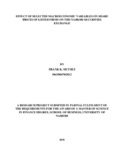| dc.description.abstract | The stock market is essential in facilitating the exchange of financial assets by acting as a platform of convergence between buyers and sellers of securities. The Nairobi Securities Exchange is one such market. This study aimed at examining the effect of selected macroeconomic variables on share prices of listed firms on the Nairobi Securities Exchange. The studied macroeconomic variables were Interest Rate, Exchange Rate, Money Supply, Unemployment Rate, GDP and Inflation Rate. Quarterly secondary data for the period January 2007 (2007Q1) to December 2016 (2016Q4) from the KNBS, CBK as well as the NSE was used in the study to investigate the relationship. Multiple regression model was employed to analyze data in STATA. The study revealed that 72.97% of variations in share prices was explained by variations in the macroeconomic variables listed above. It was then implied that 27.03% of variations in the share prices was explained by other factors not included in the study. Share prices of firms listed in the NSE were positively affected by increases in the 91 day T-Bill rate, the GDP growth rate as well as the natural logarithm of money supply. In contrast, the share prices were negatively affected by changes in inflation, unemployment as well as the USD Exchange rates. Results of the study further revealed that a unit change in GDP would cause a positive increase in share price by 54.176 units, a unit change in the 91 Day T-Bill Rate would cause an increase in share prices by 24.598 units and a unit change in the logarithm of money supply would cause an increase in share prices by 362.680 units. The results also demonstrate that a unit change in unemployment would result to a decrease of 559.71 units in share price, a unit change in the USD Exchange Rate would cause a decrease in share prices by 40.289 units while a unit change in inflation rate would cause a decrease in share prices by 127.359 units. | en_US |



